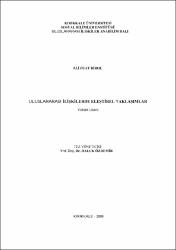| dc.contributor.advisor | Özdemir, Haluk | |
| dc.contributor.author | Birol, Ali Fuat | |
| dc.date.accessioned | 2021-01-16T18:55:10Z | |
| dc.date.available | 2021-01-16T18:55:10Z | |
| dc.date.issued | 2009 | |
| dc.identifier.uri | | |
| dc.identifier.uri | https://hdl.handle.net/20.500.12587/14488 | |
| dc.description | YÖK Tez ID: 261330 | en_US |
| dc.description.abstract | Uluslararası ilişkilerin alternatif tanımlamaları mümkün mü? bu tezin temel araştırma sorusudur. Bu tez ayrıca merkezi temsil eden kimliklerin uluslararası ilişkiler de nasıl diğer kimlikleri dışladığını araştırmaktadır.Soğuk savaşın sona ermesinden sonra uluslararası ilişkiler teorisinde iki problem popüler olmuştur. Birincisi, mainstream uluslararası ilişkiler teorilerinin Soğuk Savaşın sonunu açıklamakta yetersiz kalmalarıdır. Bazı düşünürlere göre bu sorunun nedeni, mainstream uluslararası ilişkiler teorilerinin positivist yaklaşımları benimsemelerinden dolayı değişimi tanımlamaya odaklanmamalarıdır. Ve bildiğimiz gibi positivist yaklaşımlar, değişim durumlarından çok sabit duruma odaklanmaktadırlar.Diğer problem, mevcut mainstream uluslararası ilişkiler teorilerinin malum kimliği (Beyaz, Avrupalı, Erkek) yansıtması ve diğer kimlikleri dışlamasıdır. Bu problemin arkasındaki temel neden, uluslararası ilişkilerin modern doğasıdır. Bu iki problemin ve modernitenin positivist yaklaşımlarından dolayı alternatif uluslararası ilişkiler teorisi arayışlarından beklenen, bu arayışların modernite bağlamında olmasıdır.Bu iki amaçla ilk olarak tez, moderniteyi tartışarak ve uluslararası ilişkiler ile modernitenin ilişkisi ortaya çıkararak başlamıştır. Tezin ikinci bölümü, modernite problemine temelci yollarla yaklaşan eleştirel teoriler hakkındadır. Çalışmanın üçüncü bölümünde alternatif yaklaşımlar ve teoriler tartışılmıştır. Çalışmanın son bölümü Soğuk Savaşın sonu ve 11 Eylül özelinde uluslararası ilişkilerdeki kimlik problemini göstermiştir. Bunu yaparken ilk olarak, tezin temel amacı olan alternatif arayışları gösterilirken eleştirel yaklaşımlar alternatif uluslararası ilişkiler tanımlamaları olabilir mi tartışılmıştır.Tezin temel sonuçları üç noktada özetlenebilir.İlk olarak uluslararası ilişkiler teorisinin alternatife ihtiyacı vardır ve alternatiflerin de modernite sorununa odaklanmaya ihtiyaçları vardır.İkincisi, uluslararsı ilişkilerin en önemli problemi olarak merkezi kimlikdeki adaletsizliktir. İkincisi ile çok yakından ilişkili olarak üçüncüsü, bu problemlerin temel nedeni modernitedir ve tez bunu göstermeye çalışmaktadır. | en_US |
| dc.description.abstract | The main research question of this thesis is whether or not alternative explanations of international relations are possible. This thesis also investigates if and how the identities represented by the mainstream exclude other identities in international relations.After the Cold War is over, two problems became popular in international relation theory. One is the inadequate explanations of the end of the Cold War by the mainstream international relations theories. For some scholars, reason for this problem is that mainstream international relations theories do not focus on the explanations of change, because they adopt ultimately positivist approaches. And as we know, positivist approaches focus on stable condition more than changeable conditions.The other problem is that the current mainstream international relations theories reflect a certain type identity (white, European, male) and they exclude other identities. The main cause behind this problem is the modern nature of international relations. Because of the connections between these two problems and the positivist approaches of modernity, the search for an alternative international relations theory is expected to be about modernity.Towards this purpose, first, the thesis starts with a discussion about modernity and the conceived relationship of modernity to international relations. Second part of the thesis is about critical theories that approach the problem of modernity from a foundationalist way. The third part of the work discusses alternative approaches and theories. Last part of the work displays the identity problem (disparate nature of international relations) in international relations especially after the Cold War and September 11. In so doing, the main purpose of the thesis is to display alternative research programmes first, and then discuss if the critical approaches can become alternative explanations of the international relations.The main findings of this thesis can be summarized at three points: first, international relations theory needs alternatives and these alternatives need to focus on the modernity problem. Second, the most important problem of international relations is the inequity on center of identity. The third point is closely related to the second; and it is that the main cause of these problems is the modernity, and the thesis tries to show this. | en_US |
| dc.language.iso | tur | en_US |
| dc.publisher | Kırıkkale Üniversitesi | en_US |
| dc.rights | info:eu-repo/semantics/openAccess | en_US |
| dc.subject | Uluslararası İlişkiler | en_US |
| dc.subject | International Relations | en_US |
| dc.title | Uluslararası ilişkilerde eleştirel yaklaşımlar | en_US |
| dc.title.alternative | Critical approaches in international relations | en_US |
| dc.type | masterThesis | en_US |
| dc.contributor.department | KKÜ, Sosyal Bilimler Enstitüsü, Uluslararası İlişkiler Anabilim Dalı | en_US |
| dc.identifier.startpage | 1 | en_US |
| dc.identifier.endpage | 117 | en_US |
| dc.relation.publicationcategory | Tez | en_US |
















